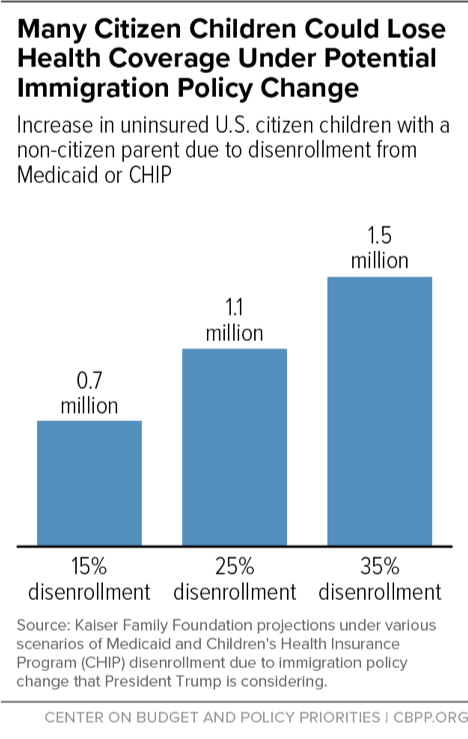BEYOND THE NUMBERS
For U.S. Citizen Children, Big Health Coverage Losses Under Potential Trump Immigration Policy
A potential radical change to immigration policy by the Trump Administration could cause many families that include non-citizens to fear signing up for public benefit programs even though they’re eligible for them. If, due to this fear, 15 to 35 percent of U.S. citizen children with at least one non-citizen parent disenrolled from Medicaid or the Children’s Health Insurance Program (CHIP), 875,000 to 2 million U.S. citizen children would lose coverage, the Kaiser Family Foundation estimates.
Under the policy that the Administration is considering, U.S. immigration authorities could deem people seeking to lawfully enter the United States and people in the United States seeking lawful permanent resident status (that is, seeking a green card) a “public charge” if they or their family members, including citizen children, receive any of a sweeping list of benefits — such as Medicaid, CHIP, Affordable Care Act marketplace subsidies, nutrition assistance, housing assistance, and refundable tax credits such as the Earned Income Tax Credit or Child Tax Credit. For those deemed a public charge and those who could become one, U.S. authorities could deny them the chance to come to the United States to reunite with their families or to become lawful permanent residents. Under current policy regarding public benefits, immigration authorities focus on cash assistance and Medicaid payment for long-term care, and they generally consider only the use of such benefits by the immigrant, not dependent family members.
The Administration hasn’t yet proposed a rule to make this policy change, and such a rule would be issued for public comment before the Administration finalizes it. But a draft proposed rule was leaked to the media, generating news coverage. Rumors of the policy change have already convinced some families to drop benefits for which they’re eligible, such as the Special Supplemental Nutrition Program for Women, Infants, and Children, widely known as WIC. While — to be clear — the rule wouldn’t change eligibility for benefit programs, policy experts agree that its implementation would create fear within immigrant communities that the receipt of such benefits could spur negative immigration consequences that could, for instance, separate families. As a result, some eligible people would forgo benefits.
In 2016, 10.4 million children living in the United States were citizen children with at least one non-citizen parent. This group would be particularly vulnerable because their families may worry about immigration-related consequences if any member receives public benefits — and Medicaid or CHIP cover 56 percent of these citizen children.
To illustrate the potential impact, the Kaiser Family Foundation analyzed what would happen to health coverage under scenarios in which 15, 25, or 35 percent of U.S. citizen children with non-citizen parents disenrolled from Medicaid or CHIP coverage (assuming that 75 percent of children who dropped Medicaid or CHIP coverage would become uninsured). As the Kaiser researchers explained, it’s hard to predict exactly what share of children could disenroll from coverage, but their estimates draw on prior research on the chilling effect of federal policies and processes.
In 2016 only 5 percent of all children up to age 18 were uninsured and 8 percent of U.S. citizen children with a non-citizen parent were uninsured. If even 15 percent of U.S. citizen children with a non-citizen parents dropped Medicaid or CHIP coverage, 700,000 children would become uninsured, almost doubling this group’s uninsured rate. If 35 percent disenrolled, 1.5 million children would become uninsured, and the uninsured rate among children with a non-citizen parent would rise to 22 percent. (See chart.)
These coverage losses would have immediate and long-term impacts on these U.S. citizen children and society. Medicaid eligibility in childhood improves adult health, increases educational attainment, and leads to higher lifetime earnings, studies find. Hundreds of thousands of U.S. citizen children would face the risk of missing out on these gains.

